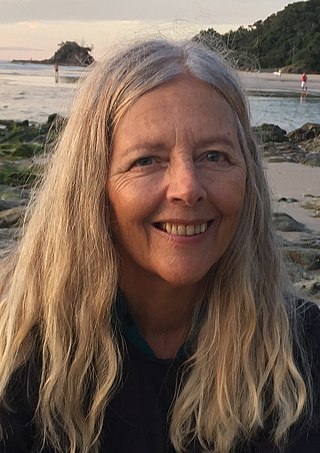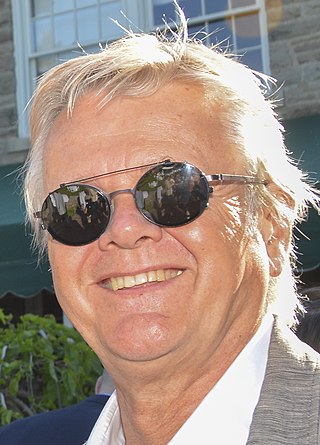
The Toronto International Film Festival is one of the most prestigious and largest publicly attended film festivals in the world. Founded in 1976, the festival takes place every year in early September. The organization behind the film festival is also a permanent destination for film culture operating out of the TIFF Lightbox cultural centre, located in downtown Toronto.

Johan Norberg is a Swedish author and historian of ideas, devoted to promoting economic globalization and what he describes as classical liberal positions. He is the author of In Defense of Global Capitalism (2001), Progress: Ten Reasons to Look Forward to the Future (2016), and The Capitalist Manifesto: Why the Global Free Market Will Save the World (2023). Since 15 March 2007, he has been a senior fellow at the Cato Institute, and since January 2017 an executive editor at Free To Choose Media, where he regularly produces documentaries for US public television.

Mina Shum is an independent Canadian filmmaker. She is a writer and director of award-winning feature films, numerous shorts and has created site specific installations and theatre. Her features, Double Happiness and Long Life, Happiness & Prosperity both premiered in the US at the Sundance Film Festival and Double Happiness won the Wolfgang Staudte Prize for Best First Feature at the Berlin Film Festival and the Audience Award at Torino. She was director resident at the Canadian Film Centre in Toronto. She was also a member of an alternative rock band called Playdoh Republic.
Local Futures is a non-profit organization whose purpose is to raise awareness about what it identifies as the root causes of contemporary social, environmental, and economic crises.

Helena Norberg-Hodge is founder and director of Local Futures, previously known as the International Society for Ecology and Culture (ISEC). Local Futures is a non-profit organization "dedicated to the revitalization of cultural and biological diversity, and the strengthening of local communities and economies worldwide."

Göteborg Film Festival (GFF), formerly Göteborg International Film Festival (GIFF), known in English as the Gothenburg Film Festival, formerly Gothenburg International Film Festival, is an annual film festival in Gothenburg, Sweden and the largest film event in Scandinavia. When it was launched on February 8, 1979, it showed 17 films on 3 screens and had 3,000 visitors.

Lauren Greenfield is an American artist, documentary photographer, and documentary filmmaker. She has published photographic monographs, directed documentary features and series, produced traveling exhibitions, and published in magazines throughout the world.

Sturla Gunnarsson is an Icelandic-Canadian film and television director and producer.

Jon Reiss is a film producer and director, and an author. He has made the feature film Cleopatra's Second Husband (1998) and the documentaries Better Living Through Circuitry (1999) and Bomb It (2007). He has directed music videos for artists, including Nine Inch Nails, Slayer, Danzig, and the Black Crowes.

Nila Madhab Panda is an Indian film producer and director. Panda has directed and produced over 70 films, documentaries, and shorts based on social issues, such as climate change, child labor, education, water issues, sanitation and other developmental issues in India. Many of his films are based on his own experiences. He has won several awards and received critical acclaim for his films which have been described as "entertaining yet socially relevant."
Daniel Fridell is a Swedish film director and producer.

Suman Ghosh is a film director, and a professor of economics at Florida Atlantic University.

Vegucated is a 2011 American documentary film that explores the challenges of transitioning to a vegan diet.

The Square is a 2013 Egyptian-American documentary film by Jehane Noujaim, which depicts the Egyptian Crisis until 2013, starting with the Egyptian Revolution of 2011 at Tahrir Square. The film was nominated for the Academy Award for Best Documentary Feature at the 86th Academy Awards. It also won three Emmy Awards at the 66th Primetime Creative Arts Emmy Awards, out of four for which it was nominated.

Voices of Transition is a 2012 documentary film by film director and producer Nils Aguilar. The film was produced in France and Germany and examines the danger posed to agricultural production by energy and resource scarcity. It depicts organic agricultural alternatives in France, the Transition Towns movement and urbanised food production in Cuba as forerunners of the transformation of food production away from industrialised agriculture and towards small-scale, decentralised production methods. The German cinema debut was held on 2 May 2013 as part of a wider German cinema tour, followed or preceded by theatrical releases and tours in Italy[34], USA[35], Portugal[36] Wallonia[5] and Flanders[6] (Belgium), Great Britain[7], Argentina and Chile.[9]

Faces Places is a 2017 French documentary film directed by renowned filmmaker Agnès Varda and artist JR. The film documents the duo as they journey through rural France, capturing the portraits of the people they meet along the way. Their collaborative process leads them to create large-scale portraits, which are then displayed on buildings and other public spaces, leaving a profound impact on both the subjects and the communities they visit.
The Toronto International Film Festival People's Choice Award is an annual film award, presented by the Toronto International Film Festival to the movie rated as the year's best film according to TIFF audience. Past sponsors of the award have included Cadillac and Grolsch.

The Biggest Little Farm is a 2018 American documentary film, directed by John Chester. The film profiles the life of John Chester and his wife Molly as they acquire and establish themselves on Apricot Lane Farms in Moorpark, California.
Canada's Top Ten is an annual honour, compiled by the Toronto International Film Festival to identify and promote the year's best Canadian films. The list was first introduced in 2001 as an initiative to help publicize Canadian films. Normally announced in December each year, the 2024 list was not announced until early January 2025.

2040 is a 2019 Australian documentary film directed by and starring Damon Gameau. The film looks at the effects of climate change over the next 20 years and what technologies that exist today can reverse the effects.
















